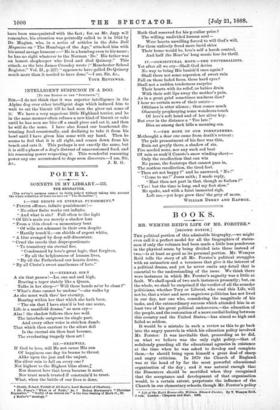POETRY.
SONNETS IN MY LIBRARY.-111. THE HEREAFTER.
[The writer's purpose cannot be fairly judard without taking into account the whole collection of these sormets cn "The Hereafter."] I.—THE DEISTS ON ETERNAL PUNISHMENT.* "FINITE offence, infinite punishment !— " No other finite works out infinite.
" And what is sin ? Full often to the light " Of life's main sea merely a shadow lent " From a thin cloud—a momentary bent " Of wills not adamant in their own despite "Hastily tonch'd ;—on shields of argent white, " A blur avenged by deep self-discontent.
" Cruel the creeds that disproportionate " To transitory sin eternal fire, " Condemned by love's great logic, that forgives, " By all the helplessness of human lives, " By all the Fatherhood our hearts desire, " By all Christ's sweet anathemas of hate."
IL—ETERNAL SIN.t A sin that passes !—Lo, one sad and high, Bearing a taper stately like a Queen, Talks in her sleep—" Will these hands ne'er be clean ?"
" What's done cannot be undone "—she walks by As she must walk thro' her eternity, Bearing within her that which she hath been.
" The sin that I have sinn'd is but one scene,
Life is a manifold drama," so men cry—
Alas i the shadow follows thee too well.
The interlude outgrows its single part, And every other voice is stricken dumb.
That which thou earnest to the silent dell Is the eternal sin thou halt become, The everlasting tragedy thou art !
111.—FREEWILL.
If God be love, will He not cause His sun Of happiness one day its beams to thrust Alike upon the just and the unjust, His silver rain to fall on every one P Not highest to the Highest bliss alone4 Nor dearest love that loves because it must, Nor trust much trusted if constrain'd to trust.
What, when the battle of our lives is done, • Chubb, Toland, Tindall of All Soars, Lord Herbert of Cherbury. t Dr. Posey's " What is of Faith," Ac. ? Bishop Hartensen's " Christian Dogmatics." "Guilty of an eternal sin" is the true reading of Mark iii., 29. * Butler's "Analogy," Hath God reserved for his p3culiar prize ?
The willing, undivided human soul—
Were hearts unwilling forced to will God's will, For them unfreely freed mere lucid skies Their home would be, love's self a harsh control, And half the Heav'ns' long music lose its thrill.
Dr.—CONJECTURAL HOPE.—THE UNIVERSALIST& Yet after all we cry—Shall God devise No way to bring His banish'd ones again ?
Shall there not some aspersion of sweet rain Fall on those faded faces, those hard eyes ?
Shall not a sudden tenderness surprise Their hearts with its relief, as babies drain With their soft lips away the mother's pain, As in a great grief sometimes madness dies P
I hear no certain news of their estate—
Of ttimes is utter silence ; then comes much Obscurely prophesying some wondrous touch Of love's soft hand and of her silver key.
But ever in the distance a " Too late !"
Dies as among dark hills a moaning sea.
V.—THE HOPE OF OUR FOREFATHERS.
Methought a dear one came from death's retreat The pale presentment of his face was thin, Ruin sat greyly there, a shadow of sin.
Fire needed none, nor any such red beat Of rain as soak'd Canute's snow winding-sheet- Only the recollection that can win No pause, the footsteps that cannot pass in, The restless recollection, the tired feet.
" Thou art not happy P" and he answered, " No !"
" Come to me !" Jesus saith ; I made reply, "Halt thou not part in that, though so forlorn P" " Yes ! but the time is long, and my feet slow."
He spake, and with a faint immortal sigh, Left me,—yet hope grew thro' the grey of morn.
WILLIAM DERRY AND RAPHOE-


































 Previous page
Previous page